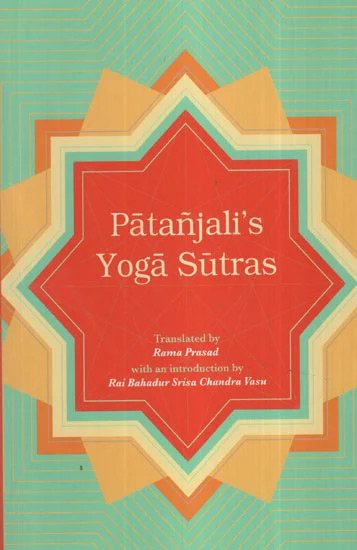Yoga-sutras (with Vyasa and Vachaspati Mishra)
by Rama Prasada | 1924 | 154,800 words | ISBN-10: 9381406863 | ISBN-13: 9789381406861
The Yoga-Sutra 3.46, English translation with Commentaries. The Yoga Sutras are an ancient collection of Sanskrit texts dating from 500 BCE dealing with Yoga and Meditation in four books. It deals with topics such as Samadhi (meditative absorption), Sadhana (Yoga practice), Vibhuti (powers or Siddhis), Kaivaly (isolation) and Moksha (liberation).
Sūtra 3.46
Sanskrit text, Unicode transliteration and English translation of Sūtra 3.46:
ग्रहणस्वरूपास्मितान्वयार्थवत्त्वसंयमाद् इन्द्रियजयः ॥ ३.४६ ॥
grahaṇasvarūpāsmitānvayārthavattvasaṃyamād indriyajayaḥ || 3.46 ||
grahaṇa—the act. svarūpa—the substantive appearance, asmitā—egoism. anvaya—conjunction. arthavattva—purposefulness (of sensation). saṃyamād—by Saṃyama over. indriya-jayaḥ—mastery over the senses.
46. By Saṃyama over the act, the substantive appearance, the egoism, the conjunction and the purposefulness (of sensation) comes mastery over them.—152.
The Sankhya-pravachana commentary of Vyasa
[English translation of the 7th century commentary by Vyāsa called the Sāṅkhya-pravacana, Vyāsabhāṣya or Yogabhāṣya]
[Sanskrit text for commentary available]
Sound, &c., possessed of generic qualities are objects. The act of sensation consists in the functioning of the senses with reference to the objects. And this functioning is not merely the taking in of the generic qualities of an object, because if also the specific qualities of an object were not thus taken in, how would they otherwise be perceived by the mind?
As to their substantive appearance, a sense is a substance; it is a collection of generic and specific qualities whose parts are not possessed of intervening space and are not distinguishable as being separate from each other. These generic and specific qualities are of the essence of the Will-to-be whose very nature is illumination.
Their third appearance is the principle of individuality characterized by egoism. The senses are the specialized appearances of that generic appearance.
The fourth appearance consists of the qualities which are of the nature of illumination, activity and inertia and which determine the nature of phenomena. The senses together with the principle of individuality are their manifestations.
The fifth appearance is that of their having the purpose of the Puruṣa to fulfil. This is inherent in the qualities. Saṃyama is to be performed over the five appearances of sensation, respectively, one after the other. When all the five appearances have been mastered, then the power of over-mastering sensation is manifested in the Yogī.—152.
The Gloss of Vachaspati Mishra
[English translation of the 9th century Tattvavaiśāradī by Vācaspatimiśra]
The author describes the means of conquering the senses for the Yogī who has mastered the elements:—‘By Saṃyama over the act, the substantive appearance, the egoism, the conjunction and the purposefulness (of sensation), comes mastery ever the senses.’ The meaning is that Saṃyama is to be performed with reference to the act, the substantive appearance, the egoism, the conjunction and the purposefulness, separately, one after another. The act of sensation consists in the taking in of objects, and this depends upon the objects to be taken in. Hence the determination of the nature of the act depends upon the determination of the nature of the objects to be taken in.
The Commentator describes the nature of the object to be taken in ‘Sounds, &c., are possessed of the generic and specific qualities.’
Having described the objects to be taken in he now describes the act of taking in:—‘And the functioning, &c.’ This functioning consists of sensing, i.e., the sense being modified into the form of the object. As to those who hold that the sphere of the function of the senses is the generic qualities alone, he says to them:—‘And it does not consist in taking in only the form of the generic qualities.’ That which is taken in is not only co-existence with the generic qualities of the object. The mind is dependent for its action upon external senses, and works upon the external objects and depends upon them. If this were not so, there would be no blind and deaf people. If, such being the case, the senses were not to have the specific qualities for their sphere of, action, the specific qualities would not at all be known, How then would the mind know them in sequence? Hence the act of sensation consists in the taking in of both the generic and the specific qualities.
This act of taking in is the first phenomenon of the senses.
Now he describes the second appearance:—‘As to substantive appearance:—It is the principle of individuality which produces the power of sensation out of its own essence (the sattva). Hence the instrumentality which is generic nature of the senses and also the action in connection with the appointed sphere of colour, &c., which is the specific quality, both are of the nature of illumination. This is the meaning.
This is their third appearance. The principle of individuality is of course the cause of the senses. Wherever the senses are there must the principle of individuality be. Being thus the common cause of the senses, it is the generic quality of these senses.
The fourth appearance:—The qualities appear as possessing two forms. They are of the nature of things which exist as such; and they are also of the nature of the power which determines, the existence of phenomena. Of these the nature of the things in existence as such consists in their being the objects of knowledge; and these are the five Tanmātras, the elements and the things made of the elements. The power again which determines the existence of the phenomena takes up the form of the instruments of knowledge, and consists of the senses together with the principle of individuality. This is the meaning. The rest is easy.—46.
